The Dialogue of Costa Rica, an innovative practice launched by the EUROsociAL+, will make it possible to articulate the actions of gender, governance and social policies in the Central American country with the challenges of the 2030 Agenda

The European Union, through its EUROsociAL+ Programme, is collaborating with Costa Rica in projects related to social inclusion and the fight against poverty; public finances; good governance; access to justice; employment policies; sexual and reproductive health and male issues; mainstreaming of the gender approach; gender budgets and statistics; and regional development.
The discussion round table: Actions and Perspectives of the EUROsociAL+ Programme in Costa Rica, was held on 17-18 October 2018 with the objective of articulating this cooperation with the 2030 Agenda and aligning it with the priorities of the 2019-2022 National Development and Public Investment Plan (NDPIP).
During the meeting, discussion spaces were developed that revolved around the areas of public policy in which the programme is structured: gender equity, democratic governance and social policies. Experiences of processes implemented thanks to the support of EUROsociAL were discussed in each of these areas.
Working sessions were also held to determine potential demands for technical assistance through the EUROsociAL+ Programme, which must be aligned with the priorities that have been presented for the 2019-2022 NDPIP.
The Minister of National Planning and Economic Policy (MIDEPLAN), María del Pilar Garrido Gonzalo, said that “this EUROsociAL Plus initiative means that, in the long term, we can change the foundations of public governance, which for any country of the world is the most important thing there is; this has to do with the quality of public policy, how we can learn from what has worked in the European Union and improve and rethink our projects”, and she added, “The three issues that have been prioritised: governance, gender and social policy are at the heart of the vision of sustainable development that we have for our country and that have been a traditional part of the architecture of the welfare system.”
For her part, Carmen Claramunt Garro, Ambassador and Deputy Director of International Cooperation at the Ministry of Foreign and Religious Affairs, highlighted the opportunity represented by the Discussion Round Table to advancing the country’s efforts towards more effective cooperation that generates transforming results within a new model of sustainable development of the 21st century, “Costa Rica, in addition to a history and a cultural heritage, shares a structure of thought and values with the European Union that underpins Democracy, the Rule of Law, the promotion, respect and protection of Human Rights and fundamental freedoms, the fight against poverty, the promotion of Sustainable Development and the commitments to addressing the challenges posed by climate change. But, in addition, both parties contribute with regional and global public goods,” she said.
For the European Union ambassador in Costa Rica, Pelayo Castro Zuzuárregui, “the 2030 Agenda for Sustainable Development unites Europe and Costa Rica and allows us to work in a common framework towards achieving shared objectives. Our DNA, our starting point is social cohesion: better public policies for fairer societies. That is why EUROsociAL is so important for our cooperation”
Impact of EUROsociAL+ in Costa Rica
The experiences that illustrate the achievements of EUROsociAL in Costa Rica, as presented at the Discussion Round Table, include: “Support for the design and implementation of the International Taxation Directorate in the General Directorate for Taxation, with a view to fulfilling the tax commitments of Costa Rica’s Process of Accession to the OECD“, by the Ministry of Finance; “Update of the National Gender Equality and Equity Policy 2018-2030“, led by the National Institute for Women; and “Support for the construction and implementation of the Bridge to Development sustainability plan that forms part of the National Strategy for the Fight against Poverty”, carried out by the Mixed Institute for Social Assistance and the Social Presidential Council.
The agreement of actors with political influence for the approval and implementation of the Regional Development Law was also highlighted, a process that has allowed ministers and government officials in Costa Rica to see the experience of European and Latin American countries in implementing policies to undertake and finance projects in the regions and which has allowed joint work between the Powers of the Republic and the agreement of the political forces.
To continue with this cooperation, a first survey was made of topics that might be supported with technical cooperation through EUROsociAL. Among the proposed actions are support for the process to decentralise gender policy (PIEG) and PLANOVI, the creation of a socio-labour support mechanism within the Bridge to Development programme; strengthening of the mechanisms for monitoring the NDP and investing in the framework of the SDGs; these initiatives will be used as input for the development of the new EUROsociAL+ cooperation programme with Costa Rica.
MIDEPLAN will be responsible for following up on these results in coordination with the Ministry of Foreign and Religious Affairs; with the support of the EUROsociAL Programme and the European Union Delegation in Costa Rica.
Programa EUROsociAL+ / MIDEPLAN / Delegación de la Unión Europea en Costa Rica / Ministerio de Relaciones Exteriores y Culto de Costa Rica



